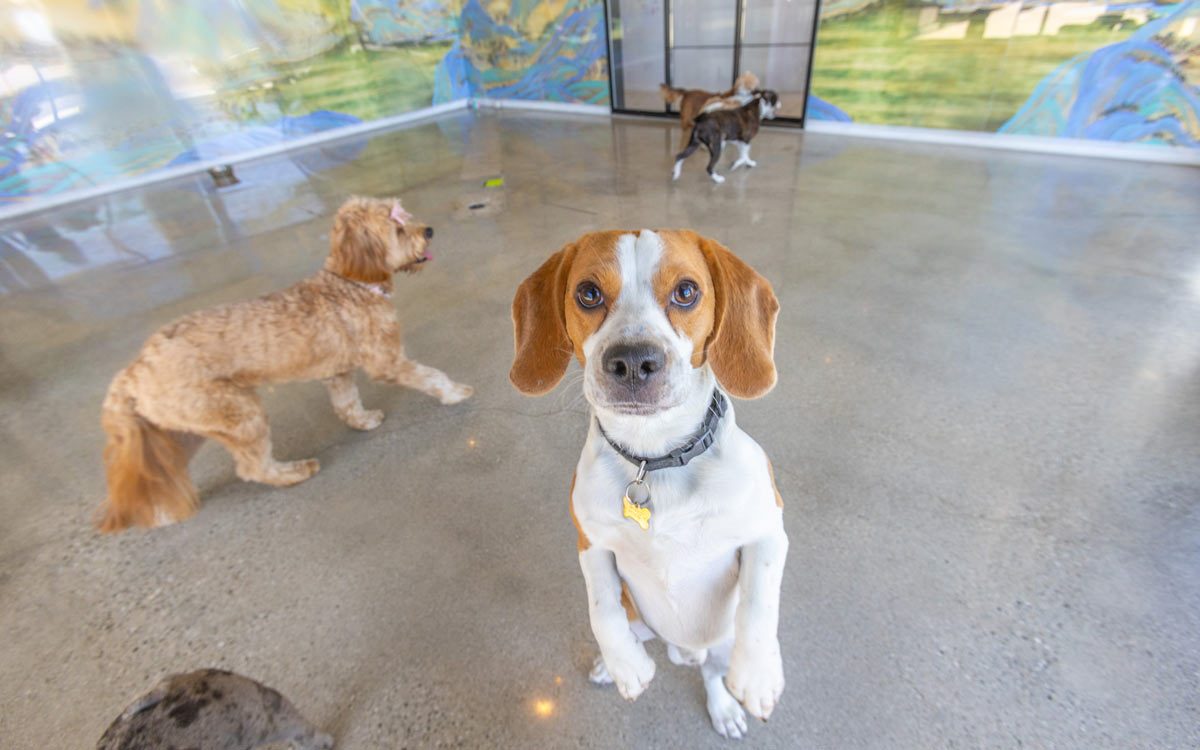DO DOGS GET SICK JUST LIKE KIDS?
Kennel cough is an ailment that is common among dogs. Due to its name, people tend to associate it with kennels or boarding facilities. In actuality, your dog does not need to be kenneled or boarded to catch kennel cough. It is caused by an airborne virus, which is highly contagious. Any time your dog is in the vicinity of an infected dog (on a walk, at a dog park, or even your veterinarian’s office) the potential for infection exists. Some dogs are simply carriers and don’t display any signs of the virus, yet they can still transmit the illness. The incubation period is about 8-10 days, so more than a week can pass after your dog has been exposed to the virus before they start to show signs of illness. As well, dogs that are socialized regularly tend to be less likely to catch the virus, as they usually have developed immunity to most pack-transmitted illnesses. That is why not every dog in a boarding facility will catch the ailment if there is an outbreak. Although there is a vaccine (Bordetella) for kennel cough, it is often not effective in preventing all strains of kennel cough. This is because there are many mutations of the virus that are ever-evolving, so it is impossible to determine whether the vaccine your dog receives will be the right one for the specific strain they have been exposed to. This is very similar to the “flu shot” for people; each year a vaccine is developed based on the most prevalent strains. Just because one gets the flu shot, does not mean they are safe from that year’s strain of flu. If your dog is in contact with other dogs, or near an area where dogs frequent, it is very possible that your dog will inevitably encounter the virus within their lifetime. Not to worry, kennel cough is simply the dog version of a common cold. For most dogs, once they catch it, they become immune to most strains and are unlikely to catch the cold again. In nearly all cases, kennel cough will run its course (within 2 weeks of the first sign of illness) without medication. Your veterinarian may prescribe antibiotics to prevent any further illness while the immune system is down. Pet parents of extremely old, young, and sick dogs should take extra precaution because of their pets delicate immune systems, and limit their exposure to dogs in general. Reputable boarding facilities will require the Bordetella vaccine to be given every 6 months in order to cover a broader spectrum of the potential strains. For more information, consult your veterinarian.
How can I protect my dog against CIRDC?
The best way to protect your dog against CIRDC is to keep his or her vaccines current. Vaccines not only reduce the chance of your dog becoming ill, they also make your dog less likely to develop severe disease or spread the infection to other dogs. This is why many facilities and events where dogs are routinely gathered, such as dog shows, training centers, and boarding facilities, require that dogs have certain vaccines.
Standard (or “core”) canine vaccines are highly effective against some CIRDC-associated viruses and are recommended for all dogs. Additional vaccines—such as those against Bordetella bronchiseptica or canine influenza viruses (H3N2 and H3N8)—are recommended for dogs of certain at-risk groups, including those whose lifestyles expose them to multiple-dog settings. Your veterinarian will help you decide which vaccines your dog needs to stay as healthy as possible, based on your dog’s lifestyle.
For further protection against CIRDC, here are some other tips:
-
- Remember, dogs can be contagious and still look perfectly healthy.
- Keep your dog away from toys and food and water bowls used by dogs outside your household.
- Stay informed by asking your veterinarian or checking news or internet resources about places or geographic regions where CIRDC, or more specific respiratory infections like canine influenza, have been reported.
- Delay or avoid travel with your dog to places where outbreaks are occurring.
ARE THERE VACCINATIONS FOR KENNEL COUGH AND CANINE INFLUENZA, AND WILL THEY PREVENT MY DOG FROM GETTING SICK?
There are two separate vaccinations that may reduce the severity of the symptoms, and the time your dog has symptoms, however, they do not prevent your dog from getting sick. Currently, recommendations are to administer the Canine Influenza vaccine, initially in two separate doses, two weeks a apart (your dog will need a booster approximately two weeks after the first vaccination) and then annually going forward. The Kennel Cough vaccination is given every 6 months to a year depending on your dogs age. Just like humans getting the flu shot, you can still get the virus or symptoms, even if you have been vaccinated against it.
ARE KENNEL COUGH AND CANINE INFLUENZA VACCINATIONS REQUIRED?
Yes Uptown Paw requires the kennel cough (Bordetella) vaccination be administered to dogs, every six (6) months for dogs under 2 years old, and once a year for dogs over 2 years old, and we strongly recommends the canine influenza vaccination. Research shows that while the Canine Influenza vaccine does not prevent infection, it does reduce the severity of the disease.
WHAT CAN I DO TO HELP PREVENT THE SPREAD OF KENNEL COUGH AND CANINE INFLUENZA?
Keep in mind that canine influenza and kennel cough are much like the human flu or cold and spread the same way. Talk to your veterinarian and keep your dog current on all recommended vaccinations. Keep your dog out of daycare and other social situations for at least 10 days if you have reason to believe your dog was exposed to either canine influenza or kennel cough. Most importantly, remember you know your dog best, so if you suspect your dog might be “a little under the weather” please, keep your dog out of social situations, as your dog is likely to be contagious even if your dog is not coughing or showing other obvious clinical signs of being sick. Please alert Uptown Paw immediately if your dog shows any symptoms or if you suspect your dog is sick.
KENNEL COUGH AND CANINE INFLUENZA – SIMPLIFIED IN HUMAN TERMS
Kennel cough and influenza are like a cold for dogs. They can catch it when they are playing with other dogs at doggy daycare or boarding, or even when they go on walks, visit dog parks or go to the beach. Just like we try to avoid getting a cold by washing our hands and covering our mouths when we cough, we can also take steps to keep our furry friends healthy by making sure they are up-to-date on their vaccinations and avoiding places where lots of dogs gather when there’s an outbreak.
Imagine visiting a daycare center for your child and find it to be clean, well run, safe, and your child is happy there. A child who happens to be coming down with a cold is at the same daycare. This child coughs and sneezes near your child and the particles containing the virus or bacteria move through the air, and are inhaled by your child. Nothing humanly possible can stop the spread of this cold unless one of two things happen. First, the child showing signs of the cold is kept home, away from other children, or the child is heard sneezing or coughing by a daycare staff member and is immediately put into isolation, away from other children. Substitute the word “dog” for “child” in the above paragraph and you have a kennel cough scenario. Kennel cough is here to stay, and the Bordetella vaccine although helpful does not prevent all dogs from getting kennel cough. At Hydrant Pet Hotel, we take cleanliness and hygiene very seriously, but it does not mean your dog will not get kennel cough during their stay with us, your veterinarian office, or any other place where dogs congregate. No dogs showing signs of illness are permitted to enter our facilities, however, a dog may be harboring the virus without showing any symptoms for 8-10 days. If you suspect your dogs has been exposed PLEASE DO NOT BRING them into contact with any other pets until your veterinarian considers them safe to be in public. Incubation period is typically 8-10 days until visible signs of illness are evident.



